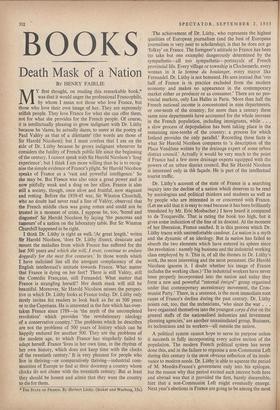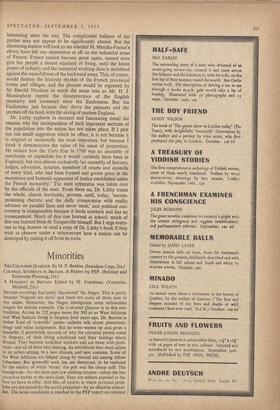BOOKS
Death Mask of a Nation
BY HENRY FAIRLIE MY first thought, on reading this remarkable book,* was that it would anger the professional Francophils, by whom I mean not those who love France, but those who love their own image of her. They are supremely selfish people. They love France for what she can offer them, not for what she provides for the French people. Of course, it is intellectually pleasing to grow indignant with Dr. Liithy because he 'dares, he actually dares, to sneer at the poetry of Paul Valery as that of a dilettante' (the words are those of Sir Harold Nicolson); but I must confess that I am on the side of Dr. Liithy because he grows indignant whenever he considers the futility of French public life since the beginning of the century. I cannot speak with Sir Harold Nicolson's 'long experience': but I think I am more willing than he is to recog- nise the simple evidence of France's plight. Sir Harold Nicolson speaks of France as a 'vast and powerful intelligence.' So she may be. But Prance was also once a great power and is now pitifully weak and a drag on her allies. France is also still a society, though, once alive and fruitful, now stagnant and rotting. Before the 1939-45 war, Sir Winston Churchill, who no doubt had never read a line of Valery, observed that the French middle class was going rotten and could not be trusted in a moment of crisis. I suppose he, too, 'bored and disgusted' Sir Harold Nicolson by laying 'the pancreas and tumours' of a nation on the laboratory table. But Sir Winston Churchill happened to be right.
I think Dr. Liithy is right as well. 'At great length,' writes Sir Harold Nicolson, 'does Dr. Lathy dissect, desiccate and mount the maladies from which France has suffered for the last 500 years and which she will, 1 trust, continue to endure doggedly for the next five centuries.' In those words which I have italicised lies all the arrogant complacency of the English intellectual's attitude towards France. What matter that France is dying on her feet? There is still Valdry, still the Comedie Frangaise, still Fernandel. What matter that France is strangling herself? Her death mask will still be beautiful. Moreover, Sir Harold Nicolson misses the perspec- tive in which Dr. Liithy looks at France today. Dr. Ltithy only rarely invites his readers to look back as far as 500 years or to the Capetians. He is interested in the fate which has over- taken France since 1789—in 'the myth of the uncompleted revolution' which provides 'the revolutionary ideology of a conservative country.' The problems which he describes are not the problems of 500 years of history which can be happily endured for another 500. They are the problems of the modern age, to which France has singularly failed to adapt herself. France 'lives in her own time, in the rhythm of her own history, which does not keep time with the clocks of the twentieth century.' It is very pleasant for people who live in thriving—or comparatively thriving—industrial com- munities of Europe to find at their doorstep a country whose clocks do not chime with the twentieth century. But at least they should be honest and admit that they want the country to die for them.
* THE STATE OF FRANCE. By Herbert Ltithy. (Seeker and Warburg, 355.) The achievement of Dr. Ltithy, who represents the highest qualities of European journalism (and the best of European journalism is very near to scholarship), is that he does not go 'folksy' on France. The foreigner's attitude to France has been (to take but one example) dangerously determined by the sympathetic—all too sympathetic—portrayals of French provincial life. Every village or township is Clochemerle, every woman in it la femme du boulanger, every mayor like Fernandel. Dr. Liithy is not bemused. He sees instead that 'one half of France is in practice excluded from the modern economy and makes no appearance in the contemporary market either as producer or as consumer.' There are no pro- vincial markets, only Les Halles in Paris. 'More than half the French national income is concentrated in nine departments, or one-tenth of the country; for more than a century these same nine departments have accounted for the whole increase in the French population, including immigrants, while . . . a slow process of depopulation has been taking place in the remaining nine-tenths of the country; a process for which Ireland provides the only parallel.' Recording these facts is what Sir Harold Nicolson compares to 'a description of the Place Vendome written by the drainage expert of some urban district council.' Actually it would be very much to the point if France had a few more drainage experts equipped with the powers of an urban district council. But Sir Harold Nicolson is interested only in the facade. He is part of the intellectual tourist traffic.
Dr. Ltithy's account of the state of France is a searching inquiry into the decline of a nation which deserves to be read by sociologists and political thinkers and students as well as by people who are interested in or concerned with France. (Let me add that it is easy to read because it has been brilliantly translated by Mr. Eric Mosbacher.) I have heard it compared to de Tocqueville. That is rating the book too high, but it gives some indication of the line of its descent. At the moment of her liberation, France ossified. It is this process which Dr. Liithy traces with uncomfortable candour. La nation is a myth and the dynamic of an ideology. But la nation has failed to absorb the two elements which have entered its sphere since the revolution : namely big business and the industrial working class employed by it. This is, of all the themes in Dr. Liithy's work, the most interesting and the most persistent. (Sir Harold Nicolson ignores it. I doubt whether his image of France includes the working class.) 'The industrial workers have never been properly incorporated into the nation and today they form a new and powerful "internal emigre" group organised under that contemporary secessionary movement, the Com- munist Party.' There, in a sentence, is the most immediate root cause of France's decline during the past century. Dr. Liithy points out, too, that the technicians, 'who since the war . . . have organised themselves into the youngest corps d'etat on the general staffs of the nationalised industries and investment planning agencies,' are another unassimilated group. Business, its technicians and its workers—all outside the nation.
A political system cannot hope to serve its purpose unless it succeeds in fully incorporating every active section of the population. The modern French political system has never done this, and in the failure to organise a non-Communist Left during this century is the most obvious reflection of its irrele- vance to modern needs. Dr. Ltithy is able to squeeze the period of M. Mendes-France's government only into his epilogue. but the reason why that period excited such interest both here and abroad was that it provided the first, barely discernible, hint that a non-Communist Left might eventually emerge. Next year's elections in France are going to be among the most interesting since the war. The complicated balance of the parties may not appear to be significantly altered. But the discerning student will look to see whether M. Mendes-France's efforts have left any impression at all on the industrial areas of France. France cannot become great again, cannot even give her people a decent standard of living, until the latent power of industry and the industrial working class is mobilised against the immobilistne of the backward areas. This, of course, would destroy the leisurely rhythm of the French provincial towns and villages, and the process would be regretted by Sir Harold Nicolson in much the same vein as Mr. H. J. Massingham regrets the disappearance of the English peasantry and yeomanry since the Enclosures. But the Enclosures, just because they drove the peasants and the yeomen off the land, were the saving of modern England.
Dr. Liithy explores in succinct and fascinating detail the reasons why the incorporation of such important sections of the population into the nation has not taken place. If I pick out one small suggestion which he offers, it is not because it is original or necessarily the most important, but because I think it demonstrates the value of his sense of proportion. He notices how the Tiers Etat in 1789 was no assembly of merchants or capitalists (as it would certainly have been in England), but was almost exclusively 'an assembly of lawyers, judges, advocates, notaries, members of courts and councils of every kind, who had been formed and grown great in the monstrous and fantastic apparatus of justice established under the French monarchy.' The state apparatus was taken over by the officials of the state. From there on, Dr. Ltithy traces the whole, almost inevitable, process, until, today, 'uncom- promising rhetoric and the daily compromise with reality advance on parallel lines and never meet,' and political con- troversy is irresponsible because it leads nowhere and has no consequences. Much of this one learned at school; much of this one learned from de Tocqueville himself. But I urge every- one to beg, borrow or steal a copy of Dr. Ltithy's book if they wish to observe under a miscroscope how a nation can be destroyed by cutting it off from its roots.



































 Previous page
Previous page